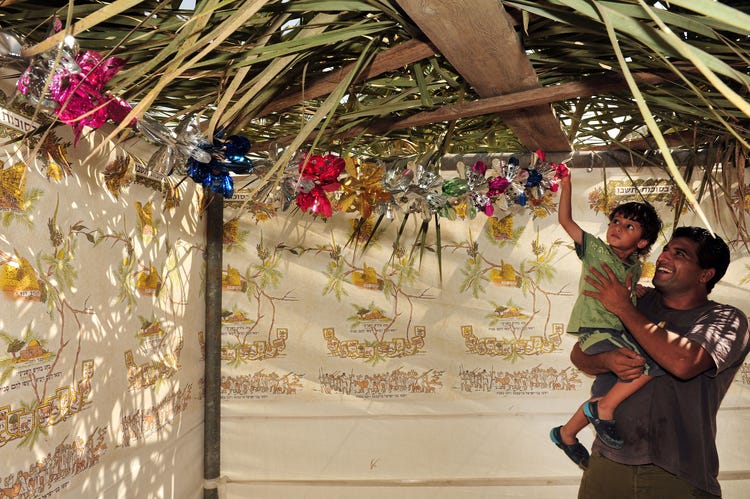What is a Sukkah?
If you went on a drive through Israel this week, you would see an array of small huts on balconies and front lawns.
Some would be decorated elaborately. Others would look like a large treehouse. But they share a purpose: observing the Jewish festival of booths, also called Sukkot.
In biblical times, Sukkot was the most important holiday. The Bible calls it Heh-chag, the holiday. It coincided with the fall harvest.
It drew pilgrims from throughout the land of Jerusalem for eight days of celebration. Sukkot is only the holy day when God commands us to be happy.
Is that possible? How do we ensure happiness on sukkot? Here are a few possibilities:
1. Sukkot sets us up for a joyous year: Sukkot is one of the first holy days of the Jewish year, which began about 15 days ago.
We pray the momentum of joy from the fall harvest will carry us through the more arduous times of the year. We're getting started, so to speak, on the right foot.
There is some wisdom in this approach. In writing, I find that when I get the first couple of sentences right, the rest of the article or sermon flows quickly and easily.
Perhaps if we get the beginning of the year right, we are more likely to find ways to experience the rest of it with greater joy and clarity. There are no guarantees, of course. But sukkot is a chance to put time and chance on our side.
2. Sukkot balances us after fasting and confessing: Yom Kippur, the day of atonement, is a somber day. We fast, confess, and look inwardly and critically at our mistakes over the past year.
Then, just as Yom Kippur concludes, we begin to get ready for Sukkot, a time of eating and socializing.
Sukkot brings balance to our hearts. If Yom Kippur is all work, Sukkot is almost all play. Together they speak to the whole person.
One of the great rabbis of the Middle Ages said God assures us we will be happy on Sukkot. There is no doubt. It is a certainty. How powerful is that? Our faith assures us of happiness.
3. Sukkot creates a faithful community, which is the secret to happiness: A common sukkot practice is inviting guests into your hut. You should also go to someone else's hut at any opportunity you can. At my synagogue, we have a tradition of "Pizza in the Hut." Clever, no?
Gathering together builds relationships. It brings us out of ourselves. It reminds us we are not alone.
It also reminds us of the true sources of happiness. It is not money. It is not status. It is meaningful relationships.
The Lesson of King Solomon
The Jewish sages encourage us to read the biblical book of Ecclesiastes during Sukkot. The search for happiness is one of its primary themes.
Its author, King Solomon of Jerusalem, has tried everything to be happy and satisfied. He eats, drinks, and is merry. He is rich and powerful. But nothing works. As he writes,
"A lover of money never has his fill of money, nor a lover of wealth his fill of income. ... As his substance increases, so do those who consume it ... A worker's sleep is sweet, whether he has much or little to eat, but the rich man's abundance does not let him sleep." (Ecclesiastes 5:10-12)
What does Solomon ultimately conclude? Wisdom is the answer. And what is wisdom?
Living in harmony with God's laws and with our fellow human beings. All the rest is commentary.



Thanks Doris! I'll check.
Hello Rabbi,
I really enjoy your podcasts.
I have been unable to renew my subscription or even start a new one.
Kindly advise. Thank you! Doris